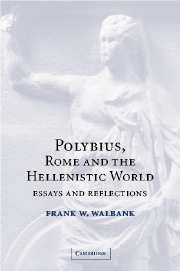Book contents
- Frontmatter
- Contents
- Preface
- Acknowledgements
- List of abbreviations
- 1 Polybian studies, c. 1975–2000
- HISTORICAL AND GEOGRAPHICAL PAPERS
- POLYBIUS AS A HISTORIAN
- POLYBIUS ON ROME
- TRANSMISSION OF POLYBIUS
- 19 Polybius, Mr Dryden, and the Glorious Revolution
- 20 Polybius through the eyes of Gaetano De Sanctis
- Bibliography
- Indexes
20 - Polybius through the eyes of Gaetano De Sanctis
Published online by Cambridge University Press: 22 September 2009
- Frontmatter
- Contents
- Preface
- Acknowledgements
- List of abbreviations
- 1 Polybian studies, c. 1975–2000
- HISTORICAL AND GEOGRAPHICAL PAPERS
- POLYBIUS AS A HISTORIAN
- POLYBIUS ON ROME
- TRANSMISSION OF POLYBIUS
- 19 Polybius, Mr Dryden, and the Glorious Revolution
- 20 Polybius through the eyes of Gaetano De Sanctis
- Bibliography
- Indexes
Summary
May I begin with a personal reminiscence? Fifty years ago, when I was just finishing my second year as a student at Cambridge, my teacher, B. L. Hallward, the author of the chapters on the Punic Wars in The Cambridge Ancient History, came to me and said: ‘You have exactly two weeks free of work before the end of term. That will be enough to learn Italian. Then, next year, you can read De Sanctis.’ As I soon discovered, he was too optimistic: two weeks is not enough to learn Italian! But I did learn sufficient to enable me (with the help of a dictionary) to read Volume III of the Storia dei Romani. It was a wonderful experience, which I have never forgotten. Through it I came to have a better understanding of Polybius, who has been a constant friend and companion ever since – as indeed he was clearly a constant companion (if not a friend) of De Sanctis himself.
As we know from his Ricordi, he first encountered Polybius as a schoolboy. After reading Thucydides, he tells us, ‘I found a translation of Polybius, and here too my attention was arrested and I was led to make efforts beyond my childish understanding to comprehend and assess the reasoned exposition of the causes of the Second Punic War; and after that I was unbelievably impressed by the lucid and dramatic account of Hannibal's invasion.’
- Type
- Chapter
- Information
- Polybius, Rome and the Hellenistic WorldEssays and Reflections, pp. 310 - 321Publisher: Cambridge University PressPrint publication year: 2002



